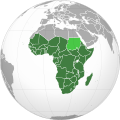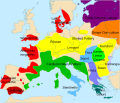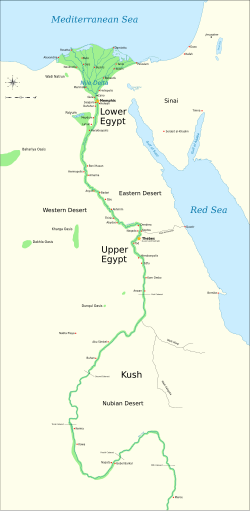Archaeogenetics is the study of ancient DNA using various molecular genetic methods and DNA resources. This form of genetic analysis can be applied to...
47 KB (5,846 words) - 14:21, 19 June 2025
Polynesians (redirect from Archaeogenetics of Polynesia)
Polynesians are an ethnolinguistic group comprising closely related ethnic groups native to Polynesia, which encompasses the islands within the Polynesian...
31 KB (2,571 words) - 16:08, 27 July 2025
Aboriginal Australians (redirect from Archaeogenetics of Australia)
Oceania is estimated to have been between 60,000 and 40,000 years ago. Archaeogenetic results indicate a colonisation of southern Sahul (Australia) before...
85 KB (8,404 words) - 02:18, 22 July 2025
Genetic history of the Indigenous peoples of the Americas (redirect from Archaeogenetics of indigenous peoples of the Americas)
of indigenous populations of the Americas. Introduction to genetics Archaeogenetics Archaeology of the Americas Ancient DNA Clovis culture Early human...
134 KB (11,002 words) - 10:31, 13 June 2025
reconstruction, along with material evidence from archaeology and archaeogenetics. The Proto-Indo-Europeans likely lived during the Late Neolithic period...
54 KB (6,405 words) - 19:27, 16 July 2025
did not yield sufficient DNA material for further analysis. The first archaeogenetic analysis of Trypillian remains was conducted by Nikitin et al. in 2010...
113 KB (12,188 words) - 08:21, 13 July 2025
The ancestry of modern Iberians (comprising the Spanish and Portuguese) is consistent with the geographical situation of the Iberian Peninsula in the South-west...
85 KB (7,962 words) - 22:31, 17 July 2025
Botai culture (section Archaeogenetics)
53°18′11″N 67°38′42″E / 53.303°N 67.645°E / 53.303; 67.645 The Botai culture is an archaeological culture (c. 3700–3100 BC) of prehistoric northern...
24 KB (2,413 words) - 21:17, 24 May 2025
Genetic history of Europe (redirect from Archaeogenetics of Europe)
needed] Europe portal Evolutionary biology portal History portal General Archaeogenetics Ethnic groups in Europe European studies Genetic history of North Africa...
144 KB (14,116 words) - 23:23, 10 July 2025
indigenous peoples of the Americas Genetic history of Europe Genetic history of Italy Genetics and archaeogenetics of South Asia Evolutionary biology portal...
95 KB (9,824 words) - 00:33, 11 July 2025
Genetic history of Africa (redirect from Archaeogenetics of Africa)
The genetic history of Africa summarizes the genetic makeup and population history of African populations in Africa, composed of the overall genetic history...
151 KB (16,174 words) - 22:31, 17 July 2025
Sub-Saharan Africa (redirect from Archaeogenetics of sub-Saharan Africa)
Sub-Saharan Africa is the area and regions of the continent of Africa that lie south of the Sahara. These include Central Africa, East Africa, Southern...
215 KB (19,765 words) - 15:56, 25 July 2025
Genetic history of North Africa (redirect from Archaeogenetics of North Africa)
The genetic history of North Africa encompasses the genetic history of the people of North Africa. The most important source of gene flow to North Africa...
95 KB (10,689 words) - 09:53, 19 July 2025
the nearby Sakas and Sarmatians were once controversial. However, archaeogenetics has confirmed their interaction with the Xiongnu, and also possibly...
193 KB (22,507 words) - 02:45, 7 July 2025
Oceania (section Archaeogenetics)
Oceania (UK: /ˌoʊsiˈɑːniə, ˌoʊʃi-, -ˈeɪn-/ OH-s(h)ee-AH-nee-ə, -AY-, US: /ˌoʊʃiˈæniə, -ˈɑːn-/ OH-shee-A(H)N-ee-ə) is a geographical region including Australasia...
331 KB (29,002 words) - 19:35, 26 July 2025
Andronovo culture (section Archaeogenetics)
The Andronovo culture is a collection of similar local Late Bronze Age cultures that flourished c. 2000–1150 BC, spanning from the southern Urals to the...
65 KB (7,169 words) - 19:28, 11 July 2025
Lengyel culture (section Archaeogenetics)
integrated into the successor Globular Amphora culture. According to archaeogenetic studies, its population had no or negligible amount of Indo-European...
11 KB (812 words) - 16:14, 3 August 2024
subject of research within the fields of human population genomics, archaeogenetics and Middle Eastern studies. Researchers may use use Y-DNA, mtDNA, other...
106 KB (11,996 words) - 22:32, 17 July 2025
Genetic history of Italy (redirect from Archaeogenetics of Italy)
including two closely related groups in Italy, comparing these with the archaeogenetic evidence, most notably from Allentoft et al. (2022). A 2024 study analysed...
128 KB (13,977 words) - 22:32, 17 July 2025
Genetics and archaeogenetics of South Asia is the study of the genetics and archaeogenetics of the ethnic groups of South Asia. It aims at uncovering these...
121 KB (12,752 words) - 12:15, 25 July 2025
Vučedol culture (section Archaeogenetics)
period in Egypt and the earliest settlements of Troy (Troy I and II). Archaeogenetics link the culture from Yamnaya migrations directly from the steppes...
23 KB (2,210 words) - 15:12, 25 April 2025
Illyrians (section Archaeogenetics)
culture into the west Balkans has ever been found. Mathieson et al. 2018 archaeogenetic study included three samples from Dalmatia: two Early & Middle Bronze...
128 KB (15,318 words) - 18:58, 21 June 2025
Head louse (section Archaeogenetics)
The head louse (Pediculus humanus capitis) is an obligate ectoparasite of humans. Head lice are wingless insects that spend their entire lives on the human...
34 KB (3,789 words) - 03:28, 12 July 2025
Paleo-Indians (section Archaeogenetics)
Paleo-Indians were the first peoples who entered and subsequently inhabited the Americas towards the end of the Late Pleistocene period. The prefix paleo-...
60 KB (5,407 words) - 06:31, 23 July 2025
Genetic history of East Asians (redirect from Archaeogenetics of East Asia)
Australasian populations. The southern route origin is strongly supported by archaeogenetic data and genetic affinities between these "East Eurasian Core" (EEC)...
179 KB (19,693 words) - 22:33, 17 July 2025
to have occurred historically. Since the 2000s, the developments in archaeogenetics have opened a new avenue for investigation, based on the analysis of...
14 KB (1,687 words) - 11:16, 24 May 2025
Ancient Egypt (section Archaeogenetics)
Ancient Egypt was a cradle of civilization concentrated along the lower reaches of the Nile River in Northeast Africa. It emerged from prehistoric Egypt...
138 KB (16,142 words) - 08:23, 17 July 2025
Genetic history of Eastern Africa (redirect from Archaeogenetics of Eastern Africa)
The genetic history of Eastern Africa encompasses the genetic history of the people of Eastern Africa. The Sahara served as a trans-regional passageway...
46 KB (4,128 words) - 20:01, 20 June 2025
Starčevo culture (section Archaeogenetics)
The Starčevo culture is an archaeological culture of Southeastern Europe, dating to the Neolithic period between c. 6200 and 4500 BCE. It originates in...
19 KB (1,959 words) - 22:42, 11 June 2025
characteristic of internal politics of India. Asia portal Genetics and archaeogenetics of South Asia List of tallest buildings and structures in the Indian...
234 KB (20,698 words) - 22:07, 21 July 2025





















